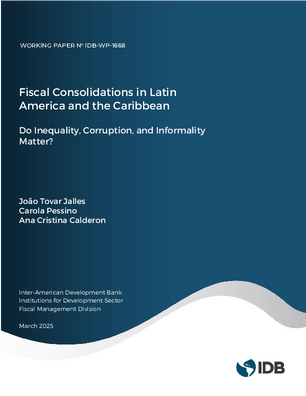Fiscal Consolidations in Latin America and the Caribbean: Do Inequality, Informality and Corruption Matter?
Date issued
Mar 2025
Subject
Fiscal Policy;
Emerging Market;
Informal Economy;
Fiscal Consolidation;
Fiscal Management;
Equality;
Public Investment Program;
Public Expenditure;
Gross Domestic Product;
Inflation
JEL code
C23 - Panel Data Models • Spatio-temporal Models;
E21 - Consumption • Saving • Wealth;
E62 - Fiscal Policy;
H50 - National Government Expenditures and Related Policies: General;
H62 - Deficit • Surplus
Category
Working Papers
Widening income disparities, higher corruption and larger informality in many emerging market and developing economies (EMDE) including Latin America, all with pressing and mounting fiscal problems, have rekindled interest in the empirical analysis of the key factors determining the occurrence of fiscal consolidations. Using discrete choice models, this paper examines the drivers of fiscal consolidation episodes in a sample of 148 EMDE between 1980 and 2019 with a focus on Latin America. Consolidations are more likely during good economic times. Inequality does not seem to drive consolidations in Latin America, while more informality increases the probability of their occurrence, corruption decreases it. In turn, when examining the drivers of successful consolidations, larger income inequality seems to act as a boost for successful consolidations, while informality hinders the likelihood of success. In fact, while the size of the public investment multiplier in Latin America is larger than in other country groups, when informality is high the multiplier effect gets reduced to a much lower and insignificant magnitude. Results are robust to several sensitivity and robustness tests.
Generative AI enabled




